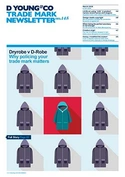Red Bull has its wings clipped: T-150/17
A recent CJEU decision confirms that “energy drinks” are not similar to “alcoholic drinks” despite the fact they are mixed, consumed and marketed together.
Background
Asolo Ltd is the owner of a EUTM for FLÜGEL (meaning wing) registered for “beers, mineral and aerated waters and other non-alcoholic drinks; fruit drinks and fruit juices; syrups and other preparations for the preparation of drinks” in class 32 and “alcoholic drinks (except beers)” in class 33. The trade mark was registered on 01 February 1999.
On 05 December 2011 Red Bull GmbH sought to invalidate the registration based on its earlier trade marks in Austria. These trade marks were VERLEIHT FLÜGEL (meaning gives wings) covering “energy drinks” in class 32 and registered on 19 May 1998 and RED BULL VERLEIHT FLÜÜÜGEL covering “energy drinks” in class 32 and registered on 05 December 1995.
Red Bull relied on the following grounds:
that the trade marks are similar and the goods are identical or similar as such there exists a likelihood of confusion on the part of the public which includes a likelihood of association with the earlier trade mark.
the earlier trade mark registration has a reputation and use without due cause would take unfair advantage of, or be detrimental to, the distinctive character or repute of the earlier trade mark.
Flying high
The cancellation division found in favour of Red Bull saying that due to the repute of the earlier trade mark VERLEIHT FLÜGEL a link could be made in the mind of the public.
Flying higher
Asolo appealed the decision to the Board of Appeal who confirmed the cancellation division’s decision. The Board of Appeal advised that for procedural reasons, the declaration for invalidity should be assessed on the grounds of likelihood of confusion only. It found that the relevant public are made up of average Austrian customers while noting energy drinks are aimed at a young public. The Board of Appeal found that ‘other non-alcoholic drinks’ include “energy drinks” and, as such, are identical. The remaining goods in class 32 “beers etc.” are all drinks with the same purpose as energy drinks, namely ‘to quench thirst’ and are in competition with “energy drinks”; can be purchased at the same point of sale and are therefore similar.
Turning to the “alcoholic drinks” in class 33, the Board of Appeal considered a certain connection with ‘energy drinks’ noting the cancellation division was right to observe that alcoholic drinks were often mixed with energy drinks and/or consumed together. Overall given the similarities between the trade marks and the goods, this would lead to a likelihood of confusion.
Seeing red
Asolo appealed to the General Court on a number of points including the assessment made on the similarity of goods insofar as it relates to classes 32 and 33. The General Court observed that the evidence filed by Asolo showed Red Bull had always denied any connection between energy drinks and alcoholic drinks. In fact, their products contain a sentence which, when translated into English, reads “do not mix with alcohol”. Asolo claimed that Red Bull had always asserted its product makes consumers more energetic and alert – the opposite of alcohol, so that customers wishing to remain alert should not consider substituting it with alcohol. The General Court observed that a very large number of alcoholic and non-alcoholic drinks are generally mixed, consumed, or indeed marketed together, either in the same establishments or as a pre-mixed alcoholic drink. However, to consider that these goods should be regarded as similar, when they are not intended to be consumed in either the same circumstances, or in the same state of mind, or as the case may be, by the same consumers, would put a large number of goods described as “drinks” into the same category. It cannot be said that “energy drinks” and “alcoholic drinks” are similar because they can be mixed, consumed or marketed together, given the nature, intended purpose and use of those goods differ. Companies which market alcoholic drinks pre-mixed with alcoholic content do not sell the ingredient separately or under the same trade mark. Many consumers in the EU are aware of this distinction and it is necessary for those who do not or cannot consume alcohol. The mere fact the products can be marketed together is not sufficient to challenge these findings.
The General Court annulled the decision insofar as there was a likelihood of confusion between the signs and ‘alcoholic drinks’ class 33 and “energy drinks” in class 32.
